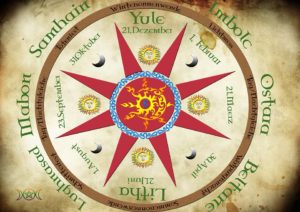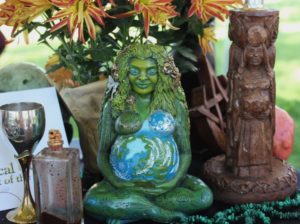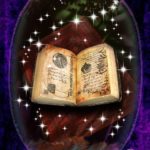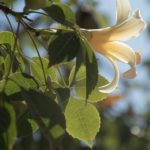Setting aside time to partake in important events and following prescribed practices, focuses our energies and affirms our place in the world.
The term ritual’ simply means carrying out a certain task according to a prescribed order or set of traditions. Modern-day ritual celebrations, such as Thanksgiving, Christmas, weddings and birthdays, allow communities and families to celebrate things they consider important be they religious or historical events or just time spent with loved ones. A ritual can be observed by a large community, a small group of friends and family, or even a single person saying a prayer alone.
Like all traditions, witchcraft has many of its own rituals that have grown and become popular over time. Witchcraft rituals help us to harness and direct the power of nature and our own energy. Most of these are simple and fun to practice, such as setting up your own altar, and many Wiccan rites can be performed in your home or garden without any specialist equipment.
Formalizing practices into rituals can help to act as a checklist’, making sure that all the necessary steps are followed in the correct order and that nothing is forgotten. It also allows the people involved time to step back and think about what they’re doing, giving them a chance to change their minds.
Rituals can be an important tool for making formal statements to others that cannot be misunderstood.
 Rituals that are practiced today to affirm or acknowledge something of importance includes weddings, which formalize the relationship between a couple, or graduations, which mark the passing of exams.
Rituals that are practiced today to affirm or acknowledge something of importance includes weddings, which formalize the relationship between a couple, or graduations, which mark the passing of exams.
Following step-by-step identity or community, rituals help you to focus your energy and to tune in to people who are following the same path, as well as connecting with those who have gone before you.
The kind of witchcraft ritual you choose to perform will depend on whether you are hoping to honor the cycle of the seasons, your passage through life, or forging your identity.
Honoring nature is at the heart of witchcraft tradition. In ancient times, the entire community would gather together to celebrate eight festivals in the ‘. These rituals known as Sabbats, fall as one season is changing to another, and at the mid-point of each season.
By observing these festivals we can tune into the rhythms and cycles of nature, connecting us with our ancestors and the land.
The eight Sabbats:
Samhain (autumn-winter)
Yule (Winter Solstice)
Imbolc (winter-spring)
Eostrata (Spring Equinox)
Beltane (spring-summer)
Litha (Summer Solstice)
Lammas (summer-autumn)
Mabon (Autumn Equinox)
Personal witchcraft rituals focus your energy, giving power to the identity you have chosen for yourself. Rituals of this kind can include:
Choosing a name. When people decide to follow the Wiccan path they often choose a witch name’, to affirm their witch identity.
Setting up altar
This is a space in your home or garden where you can practice rituals and spell casting.
Ritual tools
Many witches use ritual tools during spell casting. Making your own tools rather than buying them can imbue them with your personal energies. You can choose decorative tools for your rituals such as incense burners of goblets.
 Following the path of witchcraft or Wicca helps many people to develop personal and spiritual qualities.
Following the path of witchcraft or Wicca helps many people to develop personal and spiritual qualities.
Ritual can be especially difficult when you are just starting out on your path. When you are spell casting, for example, you will have to think things through carefully considering all possible consequences. You will have to learn to distinguish between helping people and interfering with their free will.
Remember that performing witchcraft rituals is a way of practicing magic. This focuses the mind, which is a vital skill to hone when working magic.
Simply wishing for something isn’t going to make it happen unless you’ve done everything you can to help it along. Just as someone who wishes to be a violinist must study and practice hard, so witches have to study and practice. The more you practice the more you avow your intent-your belief in your work.
Rites of passage are celebrations of ourselves.
Just as we honor and celebrate the Earth’s seasonal Wheel of the Year, so too can we celebrate the important landmarks in our own lives. The most important ones are as follows:
Birth
Menarche (first menstruation)
Hand fasting (marriage)
Menopause (last menstruation)
Requiem (death)
Observing these rituals affirms our part in a community, announcing our arrival to the world, allowing our friends to celebrate with us along the journey, and giving our loved ones a chance to say goodbye when we move on.






